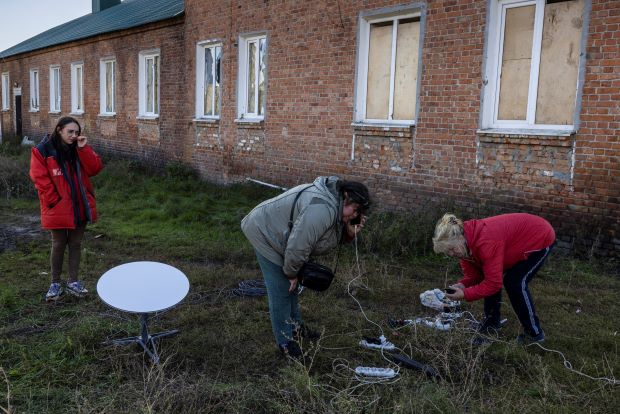Ukrainians advised to charge their devices before outages as shelling persists

By Megan Specia and Carly Olson
KYIV — Residents of the Ukrainian capital have been urged to avoid using microwave ovens and electric kettles. Shop owners are being asked to limit lighting on signs and screens. And most of Kyiv’s electric tram lines are being replaced with buses.
Nationwide curbs on electricity usage came into force across Ukraine early Thursday (20), with 10 days of Russian aerial attacks having pummelled the country’s energy infrastructure and prompting rolling blackouts.
Ukraine’s energy system has suffered more attacks over the past 10 days than during the previous eight months of the war, according to Ukrenergo, the country’s electric utility.
The difficult belt-tightening comes after President Volodymyr Zelenskyy said that Russian assaults had knocked out a third of the country’s power stations over the past week, just as the weather is beginning to turn colder, raising fears that the strikes on vital services could set off a humanitarian crisis.
The government has ordered Ukrainians to minimize their electricity use from 7:00 a.m. to 11:00 p.m., signalling a new phase of the war in which people could lack basic services as winter approaches.
Ukrenergo warned in a statement on the Telegram messaging app of rolling outages lasting up to four hours on Thursday and urged Ukrainians to charge their electrical devices.
“Please make sure that you have charged phones, power banks, water, flashlights and batteries by 7:00 a.m. tomorrow,” it said.
Most of Kyiv’s electric tram lines were replaced with buses on Thursday in an attempt to help conserve electricity, Vitaly Klitschko, the city’s mayor, said. He appealed to residents to avoid using microwave ovens and electric kettles, according to a post on Telegram. He told shop owners to limit lighting on signs and screens.
The city also turned on its heating network on Thursday, Klitschko said, “taking into account the weather conditions and the need to save electricity (so that residents of Kyiv do not heat their homes with air conditioners and electric heaters).”
Last week, Russia launched a large air campaign with missiles and drones, targeting critical infrastructure in Ukraine. On Oct. 10, electricity went out in more than 10 cities from Kyiv to Kharkiv after a flurry of missile strikes that Ukrainian officials said was intended to incapacitate the nation’s energy system. Russia said the shelling was in response to a truck bomb that damaged a critical bridge linking Russia and Crimea.
The recent strikes have destroyed 30% of Ukraine’s power stations and caused “massive blackouts across the country,” Zelenskyy said Tuesday (18), and Ukrenergo said the attacks since Oct. 10 had damaged more of the country’s energy system than strikes throughout the previous eight months.
A government minister, Oleksii Chernyshov, said Tuesday that 408 sites in Ukraine had been struck in the recent attacks, including 45 energy facilities. Many of the attacks have also hit thermal energy plants that generate steam for heating homes and businesses. On Wednesday, three additional energy facilities were destroyed.
In his nightly address, Zelenskyy encouraged Ukrainians to take the new restrictions seriously, reassuring listeners that scheduled blackouts would be shortened if enough energy is conserved. “This requires our joint efforts,” he said. “Tomorrow they are needed even more than before.”
Energy in Ukraine is highly centralized, though power stations can operate independently, so the country can be divided into “islands” of energy even when connections between them are damaged, experts on the country’s system have said.
But while the system has some resilience, they expect that it will take weeks to fully repair. And new strikes have continued near daily, with several pieces of infrastructure hit on Wednesday and air raid sirens over much of the country Thursday warning of possible attacks.
The World Health Organization has warned of the potential for a spiralling humanitarian crisis, given that a lack of access to fuel or electricity “could become a matter of life or death if people are unable to heat their homes.”
-New York Times


Comments are closed, but trackbacks and pingbacks are open.